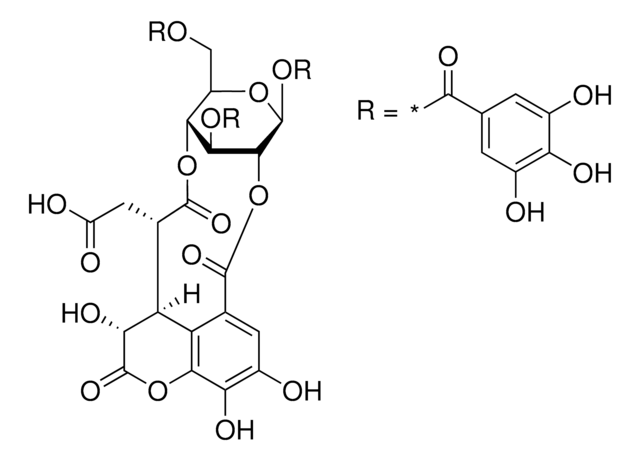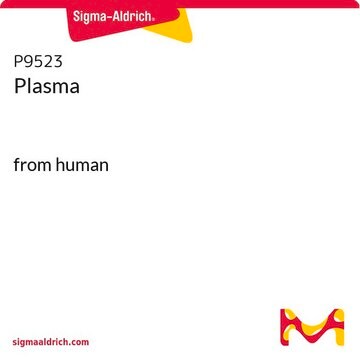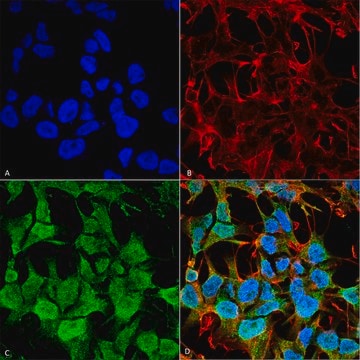추천 제품
생물학적 소스
human
Quality Level
재조합
expressed in E. coli
분석
>95% (SDS-PAGE)
형태
frozen liquid
특이 활성도
21.04 units/mg protein
분자량
23 kDa
농도
2.0 mg/mL
저장 온도
−70°C
유전자 정보
human ... GSTA1(2938)
일반 설명
using spectrophotometric determination of 1-chloro-2,4-dinitrobenzene (CDNB) conjugation with reduced glutathione (1 mM) in 100 mM NaPO4 (pH 6.5) at room temperature.
생화학적/생리학적 작용
Glutathione S-transferase alpha 1 (GSTA1) is an enzyme that in humans is encoded by the GSTA1 gene. Glutathione S-transferases (GSTs) are a family of enzymes that play an important role in detoxification by catalyzing the conjugation of many hydrophobic and electrophilic compounds with reduced glutathione. Based on their biochemical, immunologic, and structural properties, cytosolic and membrane-bound forms of glutathione S-transferase are encoded by two distinct supergene families. At present, eight distinct classes of the soluble cytoplasmic mammalian glutathione S-transferases have been identified: alpha, kappa, mu, omega, pi, sigma, theta and zeta. The GSTs are thought to function in xenobiotic metabolism and play a role in susceptibility to cancer, and other diseases.
The GSTA1 gene encodes a member of a family of enzymes that function to add glutathione to target electrophilic compounds, including carcinogens, therapeutic drugs, environmental toxins, and products of oxidative stress. This action is an important step in detoxification of these compounds. This subfamily of enzymes has a particular role in protecting cells from reactive oxygen species and the products of peroxidation. Polymorphisms in this gene influence the ability of individuals to metabolize different drugs. This gene is located in a cluster of similar genes and pseudogenes on chromosome 6. Alternative splicing results in multiple transcript variants.
저장 및 안정성
The enzyme should be used by the end-user customer within 1 year of receipt.
Storage Class Code
10 - Combustible liquids
WGK
WGK 1
Flash Point (°F)
Not applicable
Flash Point (°C)
Not applicable
시험 성적서(COA)
제품의 로트/배치 번호를 입력하여 시험 성적서(COA)을 검색하십시오. 로트 및 배치 번호는 제품 라벨에 있는 ‘로트’ 또는 ‘배치’라는 용어 뒤에서 찾을 수 있습니다.
Hong-Na Wang et al.
Clinical immunology (Orlando, Fla.), 160(2), 342-348 (2015-07-30)
Pulsed low-dose cyclophosphamide (CTX) therapy has become a very effective approach in improving the clinical outcomes of lupus nephritis (LN) patients. However, variations of CTX therapeutic outcomes in LN patients are incompletely understood. We investigated the contributions of known allelic
Chen Zong et al.
Journal of assisted reproduction and genetics, 31(3), 379-382 (2014-01-07)
Recurrent spontaneous abortion (RSA) is a multifactor and distressing disease. There are still approximately half of the RSA patients with cause not being identified to date. Accumulating studies have confirmed that genetic polymorphisms in glutathione S-transferases (GSTs) were associated with
Xue-Diao Pan et al.
Asian Pacific journal of cancer prevention : APJCP, 15(20), 8631-8635 (2014-11-07)
Glutathione S-transferase A1 (GSTA1) appears to be primarily involved in detoxification processes, but possible roles in lung cancer remain unclear. The objective of this study was to investigate the expression and function of GSTA1 in lung cancer cells. Real-time PCR
Qiwen Deng et al.
Journal of B.U.ON. : official journal of the Balkan Union of Oncology, 20(1), 287-295 (2015-03-18)
Glutathione S-transferases (GSTs) are involved in the detoxification of carcinogens, and may be linked to carcinogenesis. As a vital component of GSTs, GSTA1 plays an important role in carcinogenesis. However, the studies about the effect of GSTA1 polymorphisms on cancer
Humaira Adnan et al.
PloS one, 7(12), e51739-e51739 (2012-12-20)
The colonic epithelium continuously regenerates with transitions through various cellular phases including proliferation, differentiation and cell death via apoptosis. Human colonic adenocarcinoma (Caco-2) cells in culture undergo spontaneous differentiation into mature enterocytes in association with progressive increases in expression of
자사의 과학자팀은 생명 과학, 재료 과학, 화학 합성, 크로마토그래피, 분석 및 기타 많은 영역을 포함한 모든 과학 분야에 경험이 있습니다..
고객지원팀으로 연락바랍니다.






